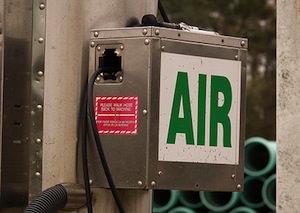Gas From the Atmosphere?
A small British company appears poised to solve the global warming and energy crises with a machine that makes gasoline out of water vapor and carbon dioxide snatched from the air.
A small British company appears poised to solve the global warming and energy crises with a machine that makes gasoline out of water vapor and carbon dioxide snatched from the air.
It sounds too good to be true, but over the last two months, a small refinery operated by Air Fuel Synthesis produced just over a gallon of petrol that can be dumped into existing engines. Within two years, the company hopes to build a larger plant that can generate a ton of gasoline per day.
The technology could conceivably enable any country that uses it to become energy independent. Communities that have abundant sources of renewable energy, such as solar, wind or wave power, but few means to store it, would be able to use such a refinery to preserve the energy in a liquid form.
Peter Harrison, the company’s chief executive, said the gasoline doesn’t have “any of the additives and nasty bits found in conventional petrol.” Harrison aims to produce the fuel on a “refinery-scale” within 15 years.
It is unclear how many refineries operating around the world would be needed to suck enough carbon dioxide out of the air to reverse global warming trends. Scientists are also uncertain as to whether other ecological processes — such as the melting of the arctic ice cover — could be reversed if global temperatures were brought down.
If the company is able to produce inexpensive fuel, expect the oil industry to attempt to smear, buy out or develop its own version of the technology.
— Posted by Alexander Reed Kelly.
Your support matters…The Independent:
Being able to capture carbon dioxide from the air, and effectively remove the principal industrial greenhouse gas resulting from the burning of fossil fuels such as oil and coal, has been the holy grail of the emerging green economy.
Using the extracted carbon dioxide to make petrol that can be stored, transported and used as fuel for existing engines takes the idea one step further. It could transform the environmental and economic landscape of Britain, Mr Harrison explained.
“We are converting renewable electricity into a more versatile, useable and storable form of energy, namely liquid transport fuels. We think that by the end of 2014, provided we can get the funding going, we can be producing petrol using renewable energy and doing it on a commercial basis,” he said.
Independent journalism is under threat and overshadowed by heavily funded mainstream media.
You can help level the playing field. Become a member.
Your tax-deductible contribution keeps us digging beneath the headlines to give you thought-provoking, investigative reporting and analysis that unearths what's really happening- without compromise.
Give today to support our courageous, independent journalists.






You need to be a supporter to comment.
There are currently no responses to this article.
Be the first to respond.